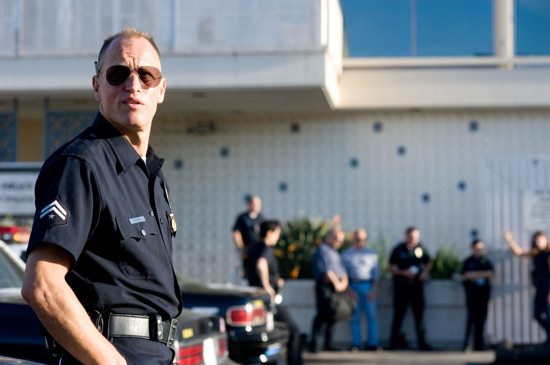What is it that attracts such ineffable bastards to coppering? Just last week I asked a bumfluffed tithead behind some ‘DO NOT CROSS’ tape what atrocity had caused the closure of the A104 (that’s the Lea Bridge Road to us humans) and was told: "That’s confidential". Luckily I’ve long passed the age when calling junior rozzers ignorant so-and-sos to their faces risks arrest, as I proved yet again before taking another route.
Still, the old trope of policeman equals uniformed criminal remains irresistible to writers and filmmakers out to show the thin margins between morality and transgression (even though children understand its subtleties as soon as they realise that their punishments don’t necessarily match their sins). And as Rampart – loosely inspired by the real-life scandal of the brutal policing centred on Los Angeles’ Rampart Street station during the late nineties – is penned by conservative anarchist James Ellroy, we can be certain that nuance is unlikely to be its strong point. (To be fair to Ellroy he’s always been something of a Hobbesian, unsurprising for a native of a city whose police numbers have never kept up with its exponential growth – New York and London both have far more lawmen in a smaller area.)
Rampart tells the story of cocky fall guy Dave Brown, a man lacking a decent nickname, or even a memorable name. (Hell, even I know two Dave Browns, one my cousin). The first time the audience hears him called ‘Date Rape Dave’, we know he has a murky past. Brown, played rather well by a taut-looking Woody Harrelson, is so old school he might as well be wearing armour and wielding a mace for his casual beatings of casual suspects. When not disgusting new recruits to the LAPD, he flirts with every woman he meets and tries to sustain a menage a cinq consisting of his ex-wives, sisters played by Cynthia Nixon and Anne Heche, and two daughters. His eldest flirts with other girls and – much worse – the West Hollywood folk-grunge busking scene, while her more serious half-sister is signally denied a normal childhood by her silly daddy. Brown is more of an East Side guy, never happier than when cracking the heads of anonymous Hispanics. When his cruiser is driven into, he catches the perp and gives him a damn good toeing. Which just happens to be filmed by a passing camcorder. (Incidentally this is all set in 1999, long before the ubiquity of cameraphones.)
The beating is so drawn-out it becomes downright comic, showing endlessly on background televisions (presented by a news reporter played by Harriet Sansom Harris, once Frasier Crane’s magnificently amoral agent Bebe). Understandably Dave wonders just why a camera should be on him on the one occasion that he doles out an almost justifiable thrashing. By the time he realises he’s been set up as a scapegoat for a public tired of police brutality by a political machine eager to deflect attention from its flaws (long after the audience – Dave is wily, even witty at times, but he really isn’t that bright) it’s too late. His course is set; he cannot be saved.
All very Bad Lieutenant then, yet we don’t even get to see him going to hell. Ellroy might be an Old Testament moralist at heart yet his anti-hero is entirely at the whim of forces he can’t comprehend, let alone control. We’ve all seen bad lieutenants, Santas and teachers tormented by their own failings. Dozy Dave instead finds himself cut adrift from his familiar world of pre-emptive punishments and with no possibility of its return. This teasing is something of a fault throughout: Rampart might be sold as an action thriller, but there really isn’t much real action, save that which follows Dave’s pick-ups in singles bars.
The film might be lacking in drama, but that doesn’t mean there aren’t serious pleasures to be taken. For a start Bobby Bukowski’s superb cinematography captures the perpetually muffled light of Los Angeles interiors uncannily. You really don’t want to think about what might be lurking in those shadows. The dialogue, especially before the downfall, crackles, Brown as cocky as any old pro sportsman leading a team of tyros. And the heavyweights taking cameos in the power broker roles – Sigourney Weaver, Steve Buscemi, Ice Cube, Ned Beatty as Brown’s old mentor – work well. Passing through, they give only a few minutes to the subject of a single rogue cop, which seems about right.
There’s an atrociously embarrassing ‘middle-aged man takes pills and has disco breakdown’ scene, true, but Billy Hough’s splendid lounge version of Johnny Thunders’ ‘You Can’t Put Your Arms Around A Memory’ almost compensates, while Dickon Hinchliffe’s bleached-out soundtrack is suitably timeless. Also the possibility that Ellroy and director/co-writer Oren Moverman are mocking the certainties of youth can’t be discounted. Brown’s original assault video has been shown endlessly in media-obsessed Los Angeles, yet we’re meant to believe not a single industrial-metallist-raver recognises him? You can be certain that Mark Fuhrman didn’t visit many warehouse parties while suspended from the force.
So Rampart is an action thriller with less action than half an episode of The Shield, a redemption story of someone uninterested in anything beyond restoring the status quo, and an existentialist riff on a man’s isolation, centred on a character who couldn’t even pronounce Antonioni, let alone spell it. It’s a mess then, albeit an interesting, flawed mess that at least doesn’t bother to make its lead character sympathetic. Whether you feel that a movie which can be summed up in the four words ‘world changes, cop doesn’t’ is worth your hard-earned is more problematic.



